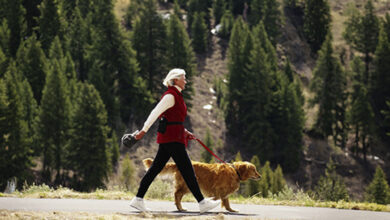Pet Parents—Do Dogs Grieve the Loss of Their Owners?


There are countless reasons why dogs are considered to be man’s best friend. They offer love, loyalty, and companionship, and anyone who has eve formed a special bond with a dog can attest to the symbiotic relationship between humans and canines. But what happens to a dog when he loses his best friend?
“When an owner passes away before her pet, it can be a confusing, sad, and difficult period, even if arrangements have been made for the animal to be taken care of by someone else,” says Russell Hartstein, a certified behaviorist and dog trainer based in Los Angeles.
It’s not unusual for dogs to grieve the loss of a person they’ve bonded with who is no longer present. While they might not understand the full extent of human absence, dogs do understand the emotional feeling of missing someone who’s no longer a part of their daily lives.
Because we can’t communicate with our dogs to explain when a loss occurs, certain indicators — such as a change in routine, or the absence of their owner’s sensations (sight, sound, smell) — convey that something is different.
“My definition of grief is that a surviving animal shows distress through behavior that is markedly divergent from his routine,” says Barbara J. King, professor emerita of anthropology at the College of William and Mary and the author of “How Animals Grieve.”
While we can’t say for sure whether the feelings a dog has when experiencing an emotional loss mirror that of a human’s, Dr. Marc Bekoff, professor emeritus of ecology and evolutionary biology at the University of Colorado Boulder, says there is now solid evidence from brain imaging studies that similar areas of dogs’ brains light up when they’re feeling parallel emotions to those of humans.
No two dogs are alike, so the way in which they grieve — and for how long — can differ. In order to decipher a dog’s emotional state after losing a loved one, it’s important to keep an eye out for certain signs, as they can affect a dog’s health. Although there is no concrete way of knowing exactly how a dog processes grief, there’s no denying the sadness expressed through behavioral changes. Anxiety and stress can present themselves in a variety of ways. Signs to be aware of include:
- Panting
- Whining
- Barking
- Pacing
- Fidgeting
 Jme Thomas, executive director at Motley Zoo Animal Rescue, explains that dogs need to figure things out on their own and work through feelings when experiencing loss or grief. Other indicators of grief include:
Jme Thomas, executive director at Motley Zoo Animal Rescue, explains that dogs need to figure things out on their own and work through feelings when experiencing loss or grief. Other indicators of grief include:
- Loss of appetite
- Weight loss
- Lack of energy
- Listlessness or clinginess
- Loss of interest in physical activity
“Dogs are highly intuitive and sensitive, more than people give them credit for,” says Thomas.
In June 2014, Constable Dave Ross, a Canadian general duty officer and police dog handler, lost his life in the line of duty. His service dog, a German Shepherd Dog named Danny, stood alongside him during his time on the force. Throughout Ross’ funeral, the loyal canine whimpered next to his master’s casket. This is just one example of many that speaks volumes to the feelings a dog experiences after losing his owner.
Like us, dogs go through a grieving period. While there isn’t one specific approach, being sensitive to a dog’s needs can go a long way:
- Be aware of routines and try to stick to them
- Provide comfort by spending more time together
- Give extra affection — touch increases your bond
- Play his favorite game and increase exercise
“I have no doubt that dogs miss us as much as we miss them, and like us, they need time to heal from a deep emotional loss,” says Sally Morgan, a holistic physical therapist for animals and humans.
How long a dog grieves varies, but with time, most recover emotionally. At the first sign of decline in physical or emotional health, consult a veterinarian to ensure the symptoms of grief aren’t masking those of another illness.






